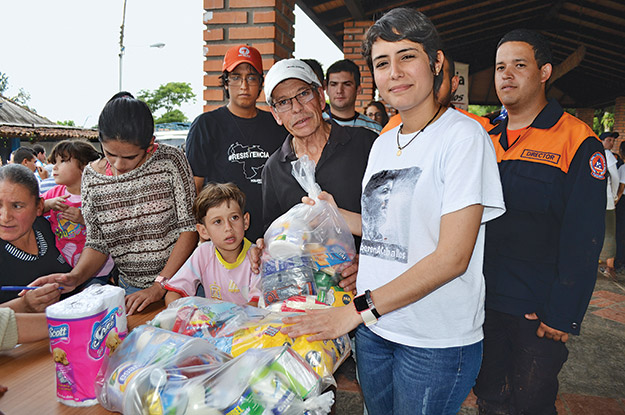This article is adapted from AQ’s most recent issue, “Fixing Brazil.” To see the rest of our Top 5, click here.
Patricia de Ceballos could have simmered in anger after her husband, Daniel Ceballos, the mayor of the Venezuelan city of San Cristóbal, was jailed following nationwide demonstrations in February 2014. But, as she put it, she decided not to be “the prisoner’s wife who stayed home and fought the government through words only.” So the then-30-year-old mother of three decided to run for her husband’s newly vacant post. Her victory two months later transformed her virtually overnight into a national symbol of resistance.
Her new career began with a secretive conversation at the maximum security Ramo Verde prison, where her husband was jailed along with Leopoldo López, another opposition leader, following protests against President Nicolás Maduro’s government that left 43 people dead. Maduro’s government had accused Ceballos of inciting violence, and he was sentenced to a year in prison for failing to heed a court order to remove barricades set up by protesters. With his immediate release unlikely, the couple agreed that Patricia would have a larger impact by stepping into the role he was forced to abandon. “I had never before thought of getting so directly involved,” De Ceballos, now 33, told AQ.
Inspired by her message, voters in the city of 1 million near the Venezuela-Colombia border awarded her a 73.62 percent victory — 6 percent more than they had given her husband. De Ceballos had become a means to defy the government, and — like Lilian Tintori and other wives of imprisoned figures — a mouthpiece for the opposition’s indignation. “I’m not only hurt by the fact that my husband is imprisoned but more so by the fact that all of Venezuela is,” she said at a 2015 protest.
Once in office, de Ceballos tied her public image to her husband’s cause, tattooing “liberty” in Daniel’s handwriting on her arm and cutting her hair short to show solidarity with him when officials shaved his head during a hunger strike.
But it takes more than symbolism to run a city. The former housewife’s life became a hectic struggle to balance her responsibilities as a parent and those of a mayor. She had to take a crash course in public administration to implement her husband’s intended policies — an effort complicated by the budget constraints imposed on opposition-led mayoralties. “What the national government gives us does not even cover a third of the payroll,” said de Ceballos, who purposefully uses the plural when discussing her tenure and refers to her husband at all her press conferences.
Despite the restraints, she has made progress on some issues left unresolved during her husband’s 77-day tenure, such as improving the city’s sanitation services. Although she conceded that she hasn’t accomplished as much as she had hoped, she maintained that her time in office illustrates “that by working with good will to serve, (and with) honesty and transparency, one can innovate and progress.”
While Daniel Ceballos was transferred to house arrest in Caracas in August 2015 to await another trial, his recent rearrest — just days before the anti-government marches on September 1 — cast further doubt on his family’s pursuit of justice. As his wife contemplates serving the remainder of her four-year term under such straining circumstances, she remains committed to being a fearless voice for her restless compatriots. “Right now (Venezuela) needs people who do things without resentment or aims of divisiveness,” she said tearfully. “I want to be on that side of history.”
—
Krygier is an editorial intern for AQ.





